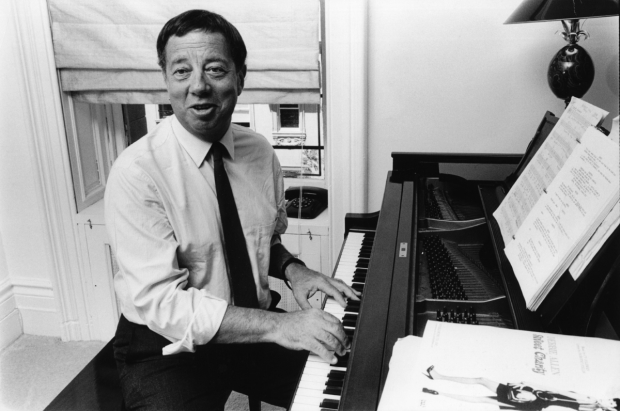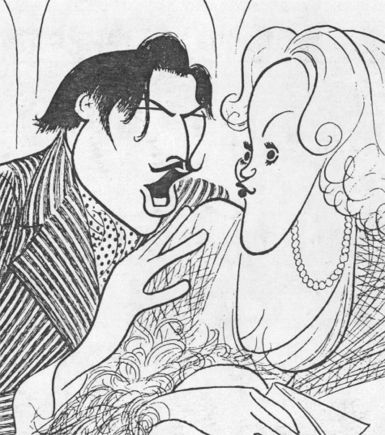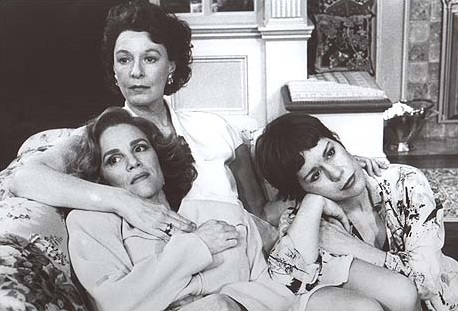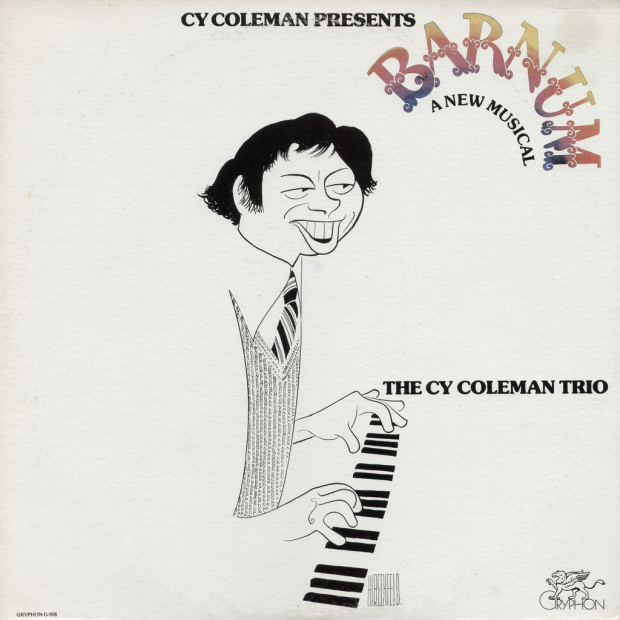Hirschfeld, Kahn, Coleman: Theater Lives Worth Contemplating (Part II)
Three new books and an art exhibit take a closer look at remarkable show-biz lives.
This is Part II of Michael Feingold's latest "Thinking About Theater" column.
Click here to read Part I.

At The Hirschfeld Century, the retrospective of Al Hirschfeld’s work on display through October 12 at the New-York Historical Society, you can seat yourself in the beloved barber chair where Hirschfeld sat down to work every day, and try your own hand at his drawing board. Lacking his decades of daily practice, however, you are unlikely to match his results. A disciplined regularity was the key to the superb distillation of the caricaturist’s art that he achieved.
The irony is that he took as his principal subject an art in which discipline and regularity, though absolutely necessary, stand in constant conflict to the form’s circumstances. Try as you will to organize the theater’s situation, it remains a potential chaos. Every performance, every production, every institutional season, offers the prospect of someone or something going hopelessly out of control. I have seen an actor die onstage. I have watched scenery fall on someone’s head on one occasion and catch fire on another. In today’s overmechanized Broadway spectacles, I’ve watched the action come to a grinding halt more times than I can count.
Similarly, I have seen actors lose their lines and try frantically to ad-lib their way back into the script. I've seen them scream at unresponsive audiences. I once saw an actress in a period piece wake a snoozing oldster in the front row by tapping his bald head smartly with her fan. The point is that theater is made by human beings. And while computers and other machines can and usually will break down, no machine can go haywire more readily than a human being.

In this regard, the lives of the actress and singer Madeline Kahn (1942-1999) and the Broadway composer-pianist Cy Coleman (1929-2004) constitute a pair of classic examples: Two beloved and highly original artists who carved out distinctive careers for themselves, meriting and receiving Hirschfeld caricatures. Two new, painstakingly researched biographies tell their respective stories: William V. Madison’s Madeline Kahn: Being the Music, a Life (University Press of Mississippi) and Andy Propst’s You Fascinate Me So: The Life and Times of Cy Coleman (Applause Theater and Cinema Books).
Though both fact-packed, the two biographies take the strongly divergent approaches that their contrasting subjects demand. Coleman, a sturdy worker bee from a solidly supportive but otherwise nonartistic family background, seems to have spent his life in a resolute and determined quest for new career opportunities. A child-prodigy pianist, classically trained (his master teacher was Juilliard’s revered Adele Marcus), he was still in high school when he landed his first Broadway gig (as rehearsal pianist for the ill-fated 1947 David Raksin-June Carroll musical, If the Shoe Fits); he was playing solo piano in nightclubs before he was 20. And within a year he was commuting between the nightspots and rehearsals of his first theater score, a summer-stock trifle called You Got a Regatta, now mercifully lost.
Coleman’s drive and productivity were as incessant as his musical imagination was wide-ranging. In the interstices between his 11 Broadway shows, he turned out piano pieces, pop songs, jazz improvisations, and special material. His choice of theatrical collaborators indicates his aesthetic restlessness: In his 11 Broadway shows, Coleman was partnered by eight different sets of lyricists. And his archive bulges with scores from other collaborations that never reached New York. Propst delves little into the possible sources of Coleman’s compulsive outpouring. His lucid, indefatigably thorough account simply chronicles the details of Coleman’s creative achievement and leaves you to wonder at the amount of imaginative effort and hard work that it took. Its small mountain of data also suggests the extent to which Coleman’s life was, like his brilliant pianism, an extended improvisation, applying the deeply inculcated discipline of his childhood training to the impulse of the moment. Despite his superb gift for sustained musical invention, he seems never to have been tempted by any larger form, like ballet or opera.

Coleman’s path crossed Madeline Kahn’s, with uncomfortable results for both, on his most substantial composition, the ornate, wittily turned music for On the Twentieth Century (1978). The comically overwrought subject matter — a battle between the giant egos of two showfolk in an earlier era — triggered a stylistic brainstorm: Coleman merged his classical and pop sensibilities to shape the score as a comic opera in the Rossini-Offenbach tradition, injected with dollops of mock-Romanticism and '20s-'30s jazz.
In Kahn, Coleman must have thought that he had discovered an unexampled instrument for his art. She was riding high on her acclaim from a string of popular film comedies, including Peter Bogdanovich’s Paper Moon (1973) and Mel Brooks’ Blazing Saddles (1974), for both of which she had received Oscar nominations. A skilled stage performer with a distinctive comic style, Kahn also possessed a lustrous coloratura-soprano voice that had inspired composers from Al Carmines to Richard Rodgers to dress her numbers with florid decorative effects. She seemed born to play the cadenza-laden Lily Garland of Coleman’s neo-operetta.
Coleman didn’t realize till later that, as Madison’s searching and compassionate study makes clear, Kahn’s surface perfection concealed a soul in a turmoil every bit as deep as his own feverish creativity. Under her hilariously imperturbable comic mask, Kahn battled deep-seated anxieties that had begun in early childhood, when her mother’s troubled marital affairs led to what Kahn perceived as her successive abandonment by both her birth father and her adoptive father. In addition, her complex and probably bipolar mother, a music teacher with unfulfilled dreams of an operatic career, had supervised her vocal training, so that every scale came with nerve-jangling expectations attached.
Coleman and Hal Prince, who directed On the Twentieth Century, thus unwittingly became an ominous pair of surrogate fathers, one initially supportive and one less so. Meantime, the role of Lily had evolved into a marathon that demanded both physical and vocal sturdiness. (Even Kristin Chenoweth, in the recent revival, seemed exhausted by the end of Act 2.) And Kahn still bore mental bruises from her previous experience of a new Broadway musical, Two by Two (1970), in which she and everyone else had been obliged to cope with the egregious behavior of its star, Danny Kaye, of whose backstage shenanigans Madison gives a hair-raising account. (Allegedly, when someone on the production team told Kahn that Kaye was being considered to play Oscar Jaffe in Twentieth Century, she replied, "Sign him, lose me.")

Perhaps inevitably, Kahn fretted over the role’s high notes, and missed performances when her nerves got the better of her. Audiences loved her, but noted her tendency to run out of steam onstage; neurosis is a great source of fatigue. Her understudy, Judy Kaye, a solider presence both emotionally and vocally, and equally gifted at comedy, found herself stepping in often, and finally replacing Kahn.
Kaye’s one lack, ironically, was precisely the fragility that gave Kahn’s persona its extra starry glow. Movie audiences knew her brash, up-front pose; her actor colleagues saw her vulnerability. "There was something that frightened her," said Joel Grey, who played opposite her off-Broadway in John Guare’s Marco Polo Sings a Solo (1977), "more than we’re all frightened when we open in a play." One can’t ever tell from the surface, of course, how deep-seated another artist’s fears are, or how they may manifest themselves. One has to press on, adhering to discipline, and do what’s necessary. But to take all the love in your heart, and pour it into your work every day may involve overlooking a colleague’s need for help. Love is infinite, but art’s demands are unremitting.
Michael Feingold's next two-part "Thinking About Theater" column will appear on consecutive Fridays September 25 and October 2.
Michael Feingold has twice won the George Jean Nathan Award for Dramatic Criticism, most recently in 2015 for his "Thinking About Theater" columns on TheaterMania, and has twice been a finalist for the Pulitzer Prize in Criticism. He serves as chairman of the Obie Awards and has also worked as a playwright, translator, and dramaturg.








